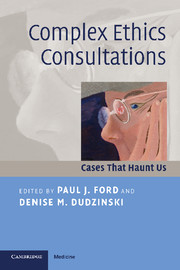Book contents
- Frontmatter
- Contents
- List of contributors
- Foreword
- Acknowledgments
- Introduction: Live and learn: courage, honesty, and vulnerability
- Part I Starting at the beginning: prenatal and neonatal issues
- Part II The most vulnerable of us: pediatrics
- Part III Diversity of desires and limits of liberty: psychiatric and psychological issues
- Part IV Withholding therapy with a twist
- Part V The unspeakable/unassailable: religious and cultural beliefs
- Part VI Human guinea pigs and miracles: clinical innovations and unorthodox treatment
- Part VII The big picture: organizational issues
- Conclusions, educational activities, and references
- Index
Introduction: Live and learn: courage, honesty, and vulnerability
Published online by Cambridge University Press: 03 May 2010
- Frontmatter
- Contents
- List of contributors
- Foreword
- Acknowledgments
- Introduction: Live and learn: courage, honesty, and vulnerability
- Part I Starting at the beginning: prenatal and neonatal issues
- Part II The most vulnerable of us: pediatrics
- Part III Diversity of desires and limits of liberty: psychiatric and psychological issues
- Part IV Withholding therapy with a twist
- Part V The unspeakable/unassailable: religious and cultural beliefs
- Part VI Human guinea pigs and miracles: clinical innovations and unorthodox treatment
- Part VII The big picture: organizational issues
- Conclusions, educational activities, and references
- Index
Summary
Introductory comments
The cases in this volume exemplify a rich cross-section of consultation experiences from which we can learn. The authors tell stories and share personal responses connected to deeply affective clinical ethics cases in which they consulted. None of these authors has selected an easy case. Ambiguity, second-guessing, and regret permeate their stories and reflections. They show great courage in laying bare such things as potential missteps, institutional impotence, and interpersonal struggles. Through their openness, we have amassed a rare collection of stories from which to learn about real-life challenges encountered by clinical ethics consultants in the incredibly complex world of contemporary health care.
Although overarching themes emerge in this volume, these cases should be read with an open mind since these themes may not be those stereotypically found in bioethics textbooks. Our cases identify challenges including uncertainty about decision-making capacity, limiting treatment requests, and obligations of healthcare providers to protect patients. The cases go beyond just tragedy. They touch on uncertainty, lack of power, and unclear professional boundaries that blend to create a mix of end-of-life, quality-of-life, organizational, and societal concerns. Naturally, the end-of-life cases represent a significant portion of this volume given the high stakes. In these end-of-life cases the endorsement of withdrawal of therapy comes alternately from families and healthcare providers. As we see from experience, the role played in a case, whether patient, family member, physician, nurse, or ethicist, does not always predict the source of a therapy-withdrawal request.
- Type
- Chapter
- Information
- Complex Ethics ConsultationsCases that Haunt Us, pp. 1 - 12Publisher: Cambridge University PressPrint publication year: 2008



